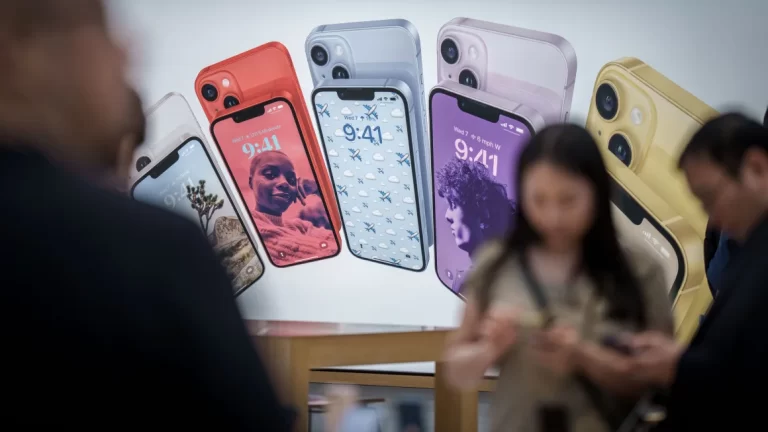When Apple launched its first Mac computer in 1984, with its iconic Mac smiley-face “hello” greeting, it wanted to differentiate itself in the fledgling PC market. The Mac was approachable with its friendly, innovative design – Apple’s way of setting the Mac apart in the confusing PC landscape.
That consumer-friendly mantra still exists today, with Apple carefully curating an easy-breezy yet controlled user experience across its products, including the billions of iPhones used around the world.
But the Biden administration believes Apple took that too far. On Thursday, the Department of Justice sued Apple for illegally monopolizing the smartphone market. In a press conference, the government provided a long list of how Apple has allegedly squashed competition with restrictive app store terms, high fees and its “walled-garden” approach, restricting how third-party companies interact with its brands and services.
The company denied the lawsuit’s allegations and said it plans to fight them. Apple added that the lawsuit could empower the government “to take a heavy hand in designing people’s technology.”
But if successful, the lawsuit could ripple across Apple’s products and services. Although the suit could take years to play out, here’s a closer look what it may eventually mean for iPhone users:
Changes to the App Store
If found liable, the company could be forced to change a number of things.
One such change is how iPhone users could get greater access to “super apps” that have been largely restricted before. The term refers to one-stop-shop apps that allow for messaging, ordering food, payment processing and other capabilities all within one platform.
According to Dipanjan Chatterjee, a principal analyst at market research firm Forrester, super apps most threaten Apple’s preeminence in the lives of its customers.
“An offering like WeChat, dubbed China’s everything app, can provide an alternative to the Apple ecosystem for people to communicate, bank, share memories, talk to businesses and more,” he said. “What Apple fears most is becoming irrelevant to its customers.”
At the same time, super apps like WeChat are created by larger companies and could, therefore, put some smaller companies at a disadvantage. And the concept hasn’t been welcomed much in the US anyway. The US government, however, could argue that lack of interest may be due to Apple’s high share of the smartphone market and its resistance to offer super apps in its store, Chatterjee said.
Better interoperability
Apple may also be required to offer more support for cross-platform messaging, an issue the company previously said it’s already working on.
The company lets iPhone users send high-quality photos and videos to one another, but similar texts to Android phones are slower and grainy. It also maintains those messages in green bubbles, creating a kind of class divide, critics argue.
In November, the company said it will add new features, such as read receipts, typing indicators, better support for group chats and higher quality media sharing of images and videos, across platforms to help close the gap. Apple’s move to add support for the standard called RCS (rich communication services) is intended to roll out later this year. RCS is considered the replacement to alternatives such as SMS, or short messaging service, and can work over both Wi-Fi and mobile data.
The change followed pressure from both regulators and competitors to more seamlessly work across operating systems. The European Union’s Digital Markets Act, for example, requires companies to make their key services interoperable between platforms. The US government could require the same.
More open services
Another likely change is how hardware from other companies, such as smartwatches, will interact with the Apple range of devices and software, including the iPhone and Apple’s services like Fitness+. The company has also required Apple Watch users to own iOS devices as a way to keep them locked into its existing ecosystem.
Chatterjee said making this change would have both positives and negatives.

“The net result would reside somewhere along the spectrum of access to more and cheaper options but also the devaluation of the customer experience that is so highly prized by Apple’s customers,” he said.
The Biden administration has also taken issue with Apple’s lack of support for mobile cloud services. Loosening this could allow users to access games and other cloud-based apps without having to pay for pricey hardware.
Inside the debate
The DOJ lawsuit claims Apple’s behavior has illegally hindered competition, kept its customers locked into its products and prevented other companies from innovating. Although the Biden administration will have to prove these harms, some critics say any potential changes Apple could make will negatively impact the user experience.
David McQueen, a research director at ABI Research, said he recognizes that the content and applications market should be open, and Apple needs to avoid monopolistic advantages that can restrict competition, push up prices or block innovation. But Apple’s success stems in part to its tight grip on its products and services, keeping things intuitive and seamless.
“If Apple is forced to comply, it could potentially spell the end to the provision of this consistent and unified user experience, although by the same token, consumers will be open to a greater choice of apps and services, helping more developers and providers,” McQueen said.
Chatterjee noted some people are drawn to the Apple family of products precisely because of the carefully managed ecosystem’s ease of use. Apple may have to work that much harder to preserve the integrity of its experience, but any changes probably won’t be enough to make customers to leave and go elsewhere.
“The vast majority of Apple customers would probably be happier with some more choice and lower prices as long as it did not hamper their levels of customer experience, which is threatened by the less control Apple has over the experience,” Chatterjee said.
But he added those currently outside of the Apple ecosystem will likely benefit by “plugging in opportunistically without having to go all in with Apple.”
— CutC by bbc.com


